Internships are great opportunities to build your resume, network, and experience the field. You can find internships in a few different ways:
Within WFCB
- Lloyd W. Swift Fund to support Experiential Learning - See below for more information.
- Museum of Wildlife and Fish Biology - Read their internship webpage and make direct contact to the museum.
- WFCB faculty and grad students - Scroll down to Summer Research Opportunities.
- Review your WFCB listserv - Check your inbox regularly for internship opportunities from WFCB advising staff.
On Campus
- The Internship and Career Center (ICC) - Offers assistance in finding internships. Visit the ICC's website for more information.
- The Undergraduate Research Center (URC) - Offers guidance and advising in obtaining research opportunities. See URC's website for more information.
- Department of Animal Science - Check out their internship webpage.
- UC Davis Undergraduate Research Opportunities in Ecology and the Environmental Sciences - A continuously updated list of undergraduate research opportunities related to ecology and the environmental sciences. Visit this page to learn more.
The EVE Scholars Program is managed by the Evolution and Ecology Department at the University of California, Davis and connects undergraduate students with summer research opportunities in evolution and ecology on the main UC Davis campus (in Davis, CA) and at the Bodega Marine Lab (in Bodega Bay, CA). The EVE Scholars Program receives funding from multiple sources, described here. While each funding source has particular requirements, students apply to the general EVE Scholars Program and will be matched with an appropriate funding source depending on their research interests, faculty mentor, and academic major. Apply by February 10th 2025
On the Programs & Pathways to Research and Advanced Degrees page we attempt to provide a listing of programs that offers research opportunities relevant to the Wildlife major. We encourage you to take a closer look at this spreadsheet, follow links and learn more about the many available programs. In addition you’ll see a few pipeline to grad school programs listed as well.
The Lloyd W. Swift Endowment Fund
The Swift fund supports experiential learning for WFCB undergraduates and is intended as an enabling opportunity for students who would not otherwise have access to these opportunities. Students can therefore apply to secure funds for (1) research opportunities in a WFCB lab, (2) research opportunities outside WFCB, (3) external internships with wildlife, fish, or conservation organizations, or (4) fees for field courses. The WFCB undergraduate awards committee oversees the fund, makes policy decisions related to implementing the awards, and decides on awards recipients. The committee is composed of 5 members: an academic coordinator and the departmental CAO (both advisory), and 3 faculty (voting members). Pernille Sporon Bøving boving@ucdavis.edu (WFCB Academic Coordinator) is in charge of coordinating undergraduate awards within WFCB and thus is the point person for the Swift opportunity.
Eligibility, rules, and restrictions:
- Only WFCB majors may apply (minors are not eligible), and the award will only go to the student.
- More than 50% of the award period must occur while the student is enrolled. Consistent with university regulations, students may not be paid as undergraduate researchers beyond 1 quarter after they graduate. For example, if you graduate June 15th and the experience is 8 weeks long, then the first 4 weeks of the experience must take place prior to June 15th.
- For research experiences, the project supervisor can be a graduate student, postdoc, research staff, or faculty; preference will be given to supervisors affiliated with WFCB versus those in other departments on the UC Davis campus.
- Students must be in good academic standing to receive an award.
- Students who have violated the WFCB Principles of Community may be denied awards.
- The maximum budget for an award is $7,500. Though students can apply for (and receive) multiple awards, no individual can receive more than $7500 over their career. Previous awardees seeking additional support from the Lloyd Swift Endowment should consider the amount in their previous award when designing budgets for subsequent proposals.
- No single organization (i.e., WFCB research lab or external organization) can receive no more than 5 awards in a year (i.e., from the Fall deadline to the following Fall deadline).
- Awards can occur at any time, including the summer, the academic year, or span both periods.
- Before applying, students must meet with a WFCB professor to discuss their application. If they are applying for a research opportunity within a WFCB lab, then this would be the lab’s PI. If it is an opportunity external to WFCB, then this would be the applicant’s assigned faculty academic advisor. In either case, the student must procure a signed statement from the professor declaring their intent to host the award account and administer the funds should the student receive an award.
- Applications should demonstrate that the financial impact of the award will be instrumental in facilitating the learning experience, and not merely replacing existing funds for the same experience. The application should be brief; aside from the basic contact information, it should indicate:
- The nature and timing of the experiential learning opportunity
- How that opportunity will advance the student’s educational or career goals
- The amount of money needed to enable the opportunity, with a budget and justification. Students may request a salary equivalent to half-time (max 20 hrs/week) during the Fall, Winter and Spring quarters, and up to 40 hrs/week during Summer quarter. Salaries and benefits will be paid on the UC scale.
- As part of the application, the student must submit a letter of support. This letter would come from their proposed supervisor and must (1) discuss the nature of the opportunity, (2) confirm they are willing to host the student, (3) establish that other funds to support the student for the experience are not available, and (4) agree to ensure that a thank you letter is submitted. If the student is entering a WFCB lab, then this statement can be the same as the one declaring their intent to administer the funds. However, if the student is pursuing an external opportunity, then two letters would be required: one from the WFCB professor declaring their intent to administer the funds (please provide this form to your assigned WFCB faculty for their signature, and attach the filled form to your application), and one from their proposed supervisor declaring their intent to host the student and discussing the nature of the opportunity.
Review procedure:
Your application will be read and evaluated by the WFCB Swift Endowment Committee. The WFCB committee will meet to discuss the applications and make award decisions based on multiple criteria, including a rubric that includes the following four prompts. Each prompt will be scored from 1-5.
- To what extent has the student clearly conveyed how this experience would help them gain new knowledge and/or skills via experiential learning?
- To what extent has the student clearly described how this specific experience would help them advance their career goals?
- Are the student’s proposed activities and their role within the broader effort clearly defined?
- Is the budget request reasonable and adequately justified?
In addition, preference will be given to research opportunities in WFCB labs over other research labs on campus. However, externships (i.e., experiences outside UC Davis) will be placed on equal footing to research opportunities in WFCB labs.
How and when to apply:
- The Swift Endowment accepts applications four times a year:
- February 15th
- April 30th
- July 31st
- October 31st
- For summer experiences, we encourage students to apply for the February 15 and April 30th application deadlines.
- A full preview of an application can be viewed here.
- To apply, complete this google form and hit the submit button once you have filled all the required entries.
Administering the award:
- For students joining a WFCB research lab, the WFCB PI oversees fund administration. Depending on the budget request, the WFCB PI might help (1) hire the student as an undergraduate researcher, (2) approve all subsequent time sheets, (3) help the student procure necessary supplies and sign off on purchases, and (4) help the student submit travel expenses and sign off on travel reports.
- For students participating in an opportunity external to WFCB, the WFCB Experiential Learning coordinator (Pernille Sporon Bøving) will oversee fund administration. Depending on the budget request, Pernille might help (1) hire the student as an undergraduate researcher, (2) approve all subsequent time sheets, (3) help the student procure necessary supplies, and (4) help the student submit travel expenses. The WFCB PI who hosts the award (i.e., the student’s academic advisor) will approve purchases and travel reports.
- The student will indicate the award start and end date at the time of the application. Funds must be expended within 60 days of the conclusion of the experience.
- If the student would like to request a ‘no-cost-extension,’ then they must submit a written request and justification for their request to the WFCB Experiential Learning coordinator (Pernille Sporon Bøving) before the end date of the award.
- Funds must be expended according to the original budget proposed.
- If the student would like to request a re-budget during the award, then they must submit a written request and justification to the WFCB Experiential Learning coordinator (Pernille Sporon Bøving) before alterations to the budget are made.
- Small changes to the budget (i.e., <10% of the total award value) are automatically approved and do not need to be submitted.
- At the conclusion of the experience, the awardee, in collaboration with the supervisor, will briefly explain how Swift funds were spent and will write a letter to the Swift family. The letter should summarize the experience and its importance, and thank the family for making that experience possible.
Credit For Internships:
Students can receive credit for internships via units and/or transcript notation.
92/192: Variable unit internship. Ask the faculty member if you can register for 92/192 units, and then contact the department staff adviser to obtain a Course Registration Number (CRN). The number on units your register for depends on the number of hours you work. Use ICC guidelines to determine this number. You will need to register for your internship by the 12th day of the quarter. After this time, you will need to be issued a PTA by the department’s staff adviser. Transcript notation can be obtained through the ICC with cooperation from your employer. See the ICC's instructions for more
information.
Summer Research Opportunities:
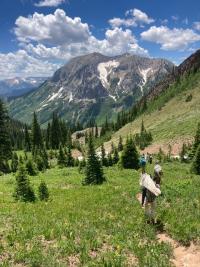
Field data collection at the Rocky Mountain Biological Laboratory
Hi, my name is Sabine Dritz, and I am a PhD candidate in the Graduate Group in Ecology. I am seeking one undergraduate student to assist me with field data collection at the Rocky Mountain Biological Laboratory in Crested Butte, Colorado. This position will run from mid-June to mid-August 2026. The objective of the study is to determine how bumblebees’ foraging paths evolve over time in response to changes in flower assemblage and density. To do so we will use both observational and remote sensing techniques. As a field technician you will assist with paint marking individual bumblebees and tracking them throughout their foraging bouts. Through this experience you will become proficient at flower and bumblebee identification, learn about remote sensing methods, develop data management skills, and contribute to new understanding of bumblebee behavior. I will provide all necessary training in Davis during spring quarter and on site during the summer. I’m looking for someone enthusiastic, dedicated, and open minded.
If interested, contact me (sjdritz@ucdavis.edu) to apply for the internship. Please include in the email (1) a one-page cover letter stating why you are interested in this position as well as any relevant experience and (2) your CV or resume. If selected, you and I will proceed collaboratively to write and develop a Swift Endowment application in order to seek funding to support your position.
Please reach out to me by November 1st so that we have plenty of time to develop an application together.
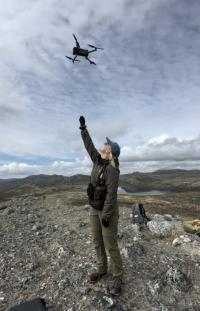
Field Assistant Opportunity in Greenland
Come help us conduct fieldwork at our long-term study site in Kangerlussuaq, Greenland! We are seeking 1-2 motivated undergraduate students to assist with collecting field and remote sensing data just above the Arctic Circle. Our research focuses on how climate change is affecting Arctic vegetation and wildlife. Fieldwork involves recording plant phenology, conducting large mammal surveys, piloting drones, and collecting vegetation samples. Through this position, students will gain hands-on experience identifying Arctic plants, gain training in piloting large-scale drone surveys, and gain valuable experience with large herbivore surveying. Students will also develop practical research skills in field ecology and data collection/organization while working in a remote Arctic environment.
Fieldwork for this project typically runs from May through late June or early July, with flexible start dates to accommodate students’ final exam schedules. Applicants must be first-through third-year WFCB students. Those who have taken or plan to take Dr. Post’s Climate Change Ecology course in Winter 2026 are especially encouraged to apply, as our work directly connects to topics covered in that class. No field experience is required for this position; however, it is suggested that you are comfortable camping in remote areas and are prepared to spend long periods of time outdoors.
This position is contingent on receiving a SWIFT grant, which will help fund flights, food, and lodging while in Greenland, as well as a student stipend. Selected students will work directly with Nikki Williamson, a PhD student in the Post Lab, to complete the SWIFT grant application and plan travel logistics.
If you are interested or have any questions, please email Nikki at njwilliamson@ucdavis.edu with your CV and a one-page letter of interest. The first round of applications will be due on October 20, 2025 by 5 pm.
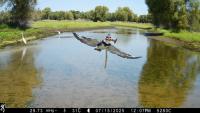
Undergraduate Moist-Soil Seed & Camera Trap
Lab Technician
Description: We are seeking one undergraduate lab technician to assist in a project analyzing the effects of wetland management regimes on mosquito control, moist-soil seed production, and wildlife use at Bird Haven Ranch - a waterfowl and wetland property near Butte City, CA. This position will likely start during Fall Quarter 2025, but could start and/or continue into Winter Quarter 2025. Once hired, the applicant should be available to participate on the project for 10 hours per week, with the option of working more if so desired. The lab technician will work with graduate student, John Veon, to process samples of moist-soil seeds in the Eadie and/or Karp Labs on the UC Davis campus. The technician will be trained to identify moist-soil seeds to family (genus and species when possible) and sort them appropriately, as well as derive biomass estimates. They will enter data into spreadsheets and develop protocol write-ups as needed. Once seed samples are completed, there may be an opportunity to help process game camera data. During game camera work, the student would learn to identify species of wildlife using camera trap software. Ultimately, the data collected from this work will help us to better understand how more sustainable wetland management practices may not only reduce mosquitoes, but also impact the biomass of moist-soil seeds (the key food resource for migratory waterfowl) and wetland wildlife use.
The ideal applicant will be interested in wildlife ecology, wetland ecology, and conservation. Experience and interest in plant (moist-soil seed) identification and sorting skills, as well as bird identification skills, would be helpful, but are not required. Successful applicants must have a positive attitude, an interest in conservation research, and be comfortable working in a lab setting.
Application Materials: Please e-mail a single PDF of a cover letter stating why you are interested in the position and any relevant experience, CV/resume, and contact information for at least one reference to John Veon at jtveon@ucdavis.edu. The subject header of the e-mail should read “IWM Undergraduate Technician Application”. The initial review date is October 28th, 2025. However, we will continue to entertain applications until the position is filled.

The Smith Ecology Lab page is a great undergraduate research and internship resource.
Non-WFCB Field Courses:
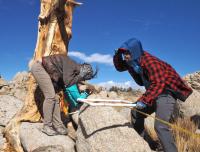
California Ecology and Conservation brings together 27 students from across the UC system for seven weeks of intensive learning at NRS reserves. Guided by experienced field instructors, undergraduates transform into scientists by conducting independent research studies. Students learn to notice natural patterns, frame questions into feasible research projects, and practice standard techniques such as surveys of animal and plant populations. At the conclusion of each project, students analyze their data and present their findings to the class in oral presentations, posters, and reports. Students hone their research, public speaking, and scientific writing skills with constant practice and feedback. All the while, students gain a working familiarity with California’s diverse ecosystems while immersed in the NRS’s classrooms without walls. Photo credit: May Roberts.
External Internships:
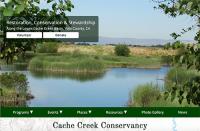
The Cache Creek Conservancy offers internships to college and university students or recent graduates. Their internship programs usually follow the seasons, Winter, Spring, Summer and Fall.
Ecological and Environmental Interns assist Conservancy staff with habitat restoration for native wildlife and plants within the nature preserve and other sites along the lower Cache Creek watershed.
The internship program has three distinct special project teams. Applicants are encouraged to select a project team in their application.
These internships are unpaid by Cache Creek; however, credit units may be available with the support of a faculty sponsor from your major department plus as a WFCB major you are eligible to apply for Swift Endowment support for the hours served at Cache Creek.

Wild cat study in Belize
Please note this experience is volunteer and requires a project fee (see below), which covers room, board, and in-country transport. Additionally, participants must provide own transportation to Belize. We have worked with numerous students to find grant funding and to obtain university credit.
We are seeking 5-10 motivated field assistants for our wild cat study in Belize, Central America. This study focuses on jaguars, pumas, and ocelots using non-invasive detection methods and researches long-term demographics of jaguar populations and the impacts of selective/sustainable logging at multiple sites across Belize.
Interns will gain extensive field experience setting up large remote camera grids across tropical broadleaf and/or tropical pine forests, conducting habitat surveys in neotropical forest, orienteering with GPS and map and compass, field vehicle maintenance, organizing and entering data and maintaining a database.
Job includes EXTENSIVE driving and hiking on dirt roads and trails to remote camera stations and collecting vegetation data surrounding camera stations. Field assistants may be required to carry heavy equipment, and will hike long distances through rough terrain, and bushwhack through thick vegetation. Work will also include shared data entry, camp and vehicle maintenance, and other errands and household chores.
Rustic living conditions in a tropical environment (meaning very hot and humid weather, snakes, and biting insects). Field assistants will be living in close living quarters with their co-workers and will be expected to help out with group cooking, cleaning, and other basic field-house chores.
Qualifications
Preference given to students in wildlife biology or related field (biology, forestry, natural resources, etc.). No experience is necessary, but the applicant must have a positive and flexible attitude, be enthusiastic and ready to learn, have a strong work ethic and ability to get along with others in tight, close-knit, living conditions.
Ability to drive a standard (manual) transmission and backpacking skills are not required but are a plus.
This is an internships position where the technician will need to pay for their plane ticket and a project fee of $1850 per month (1 month minimum required). This project fee covers food, accommodations, and all in-country transport, while in Belize (except for days off or vacation days). The experience is a resume builder for wild cat work. It is much less expensive than a typical study abroad experience. A large number of past students have received funding and/or independent study credit from their host institution to participate.
Summer positions available from May 2025 through August 2025
Please e-mail a resume/cv, letter of interest, and list of three references with contact info to Darby McPhail at dkm5ek@virginia.edu; David Lugo (dal0826@vt.edu) and Marcella Kelly at makelly2@vt.edu
Application Deadline: Rolling, will be filled continuously.
Should you successfully land an internship with the Wild Cat project you become eligible to apply for a Lloyd W. Swift endowment to support project fee and airfare. If you have any questions please reach out to Experiential Learning Coordinator Pernille Sporon Bøving; boving@ucdavis.edu.

San Diego Zoo Wildlife Alliance (SDZWA) can place interns into diverse opportunities within its large multi-disciplinary science team (>200 researchers) dedicated to conservation, as well as its Veterinary Services and Applied Animal Welfare teams. All work provides meaningful applications for managing and recovering species at-risk of extinction, and will involve working with samples, live animals or plants living in the wild or under human care, and human communities. Example opportunities include the following (1) Conservation Genetics -processing genetic samples (DNA extractions and DNA quantification from tissue, blood, cells), basic molecular biology techniques (PCR, gel electrophoresis) and sequencing (Sanger sequencing, fragment analysis, and next generation sequencing). (2) Reproductive Sciences - apply basic physiological methods to conduct research on telomere loss and chronic physiological stress (using multiplex qPCR, endocrine assays, cell cultures) or evaluating extra-pair copulations (EPCs) in bird populations (DNA fingerprinting). (3) Disease Investigations - work with animal samples to assess health and diagnose disease, including time in one or more of our laboratories: clinical, molecular diagnostic, pathology, and histology. (4) Recovery Ecology and (5) Population Sustainability - apply the latest techniques and technologies for collecting ecological and behavioral data on animals living in the wild or human care, including field habitat surveys, electronic data collection and management, radiotracking, ArcGIS spatial mapping, camera trap photo analysis, and the techniques of animal care and reintroduction biology, including a Conservation Technology Lab that develops technological tools to advance conservation action. (6) Community Engagement -participate in curriculum design, informal science education, community-based participatory conservation, capacity building, and socio-ecological research. Veterinary and (7) Nutritional Services - mentorship in clinical and nutritional practice, including applying scientific principles to health management and intervention, collecting and analyzing data to inform management decisions, and partnering with the Conservation Technology Lab to monitor and enhance animals’ physical, nutritional and psychological health. (8) Applied Animal Welfare - employ behavioral data collection and analysis to develop-science based interventions to increase behavioral diversity and improve welfare. (9) Plant Conservation - opportunities include seed collections of San Diego County rare plant species, germination and storage trials, and propagation for restoration; plant-pollinator interactions; vegetation and associated animal surveys and weed management in natural areas.
HOW TO APPLY: To apply for an internship with SDZWA you must be a current undergraduate student in the Department of Wildlife, Fish and Conservation Biology Department at UC Davis and in good standing. If you are interested, please contact Holly Davis, SDZWA Conservation Science Coordinator via email Hodavis@sdzwa.org directly to learn more, and include a cover letter plus recent resume. Should you be offered an internship with SDZWA, you will proceed to apply for a Lloyd W. Swift award. The SDZWA internship will ultimately be contingent upon you receiving a Swift award.
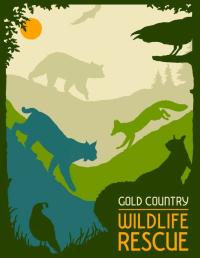
Wildlife Intake Center (WIC) Internship. The Wildlife Intake Center (WIC) Internship provides hands-on experience in the Gold Country Wildlife Rescue (GCWR) clinic working with injured and orphaned wildlife. Interns learn basic animal caretaking procedures, medical protocols, and in-depth species identification and natural histories.
Interns will work alongside staff and other volunteers/interns to complete all tasks associated with animal rehabilitation. Interns will primarily work in the WIC helping with cage cleaning, animal feeding, medication distribution and other daily tasks. Some duties, however, may include animal pick-ups from vets, or special projects as needs arise.
Gold Country Wildlife Rescue is a non-profit organization, dedicated to the rescue, rehabilitation, and release of injured and orphaned wildlife. We are permitted through the California Department of Fish & Wildlife, and the US Fish & Wildlife Service. We have been serving the local community since 1991 and do so at no charge.
Internship Location: 11251 B Ave., Auburn, CA 95603. Start/End Date: Applications are accepted on a rolling basis and admitted based on preset orientation dates. However, the best time to intern with us is during our busy baby season. Anytime from March through October we received our largest amount of animal intakes. During these months interns get to see and work with the largest variety of species.
Orientations are typically held February, April, June, and August. Additional orientations are held as needed. Dates can be flexible depending on intern availability and seasonal needs.
If interested in a specific timeframe, please contact volunteers@goldcountrywildliferescue.org for additional information.
Minimum Age Requirement: 18+ years. Minimum Time Commitment: At least 16 hours per week, for a minimum total of 200+ hours over the course of the internship session. Housing/Transportation: No housing or transportation is provided to interns by GCWR. All housing and transportation arrangements are the responsibility of the intern. Salary: This an unpaid internship, but should you successfully land an internship with GCWR you become eligible to apply for a Lloyd W. Swift endowment as a WFCB major.
For more information and to apply visit: goldcountrywildliferescue.org/internships/
